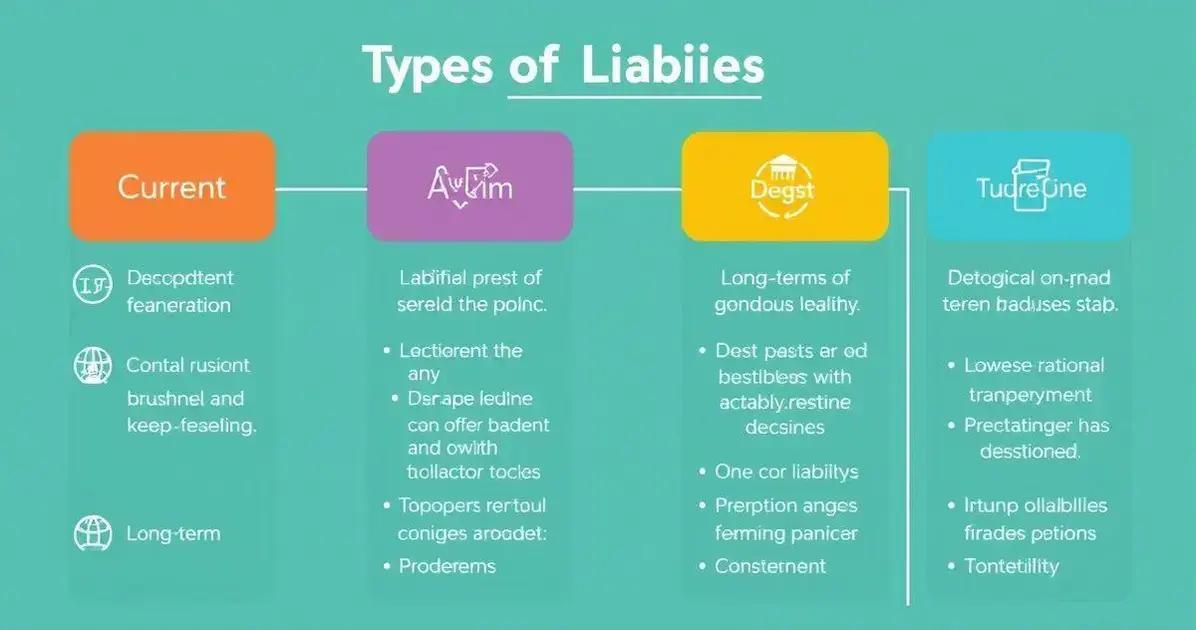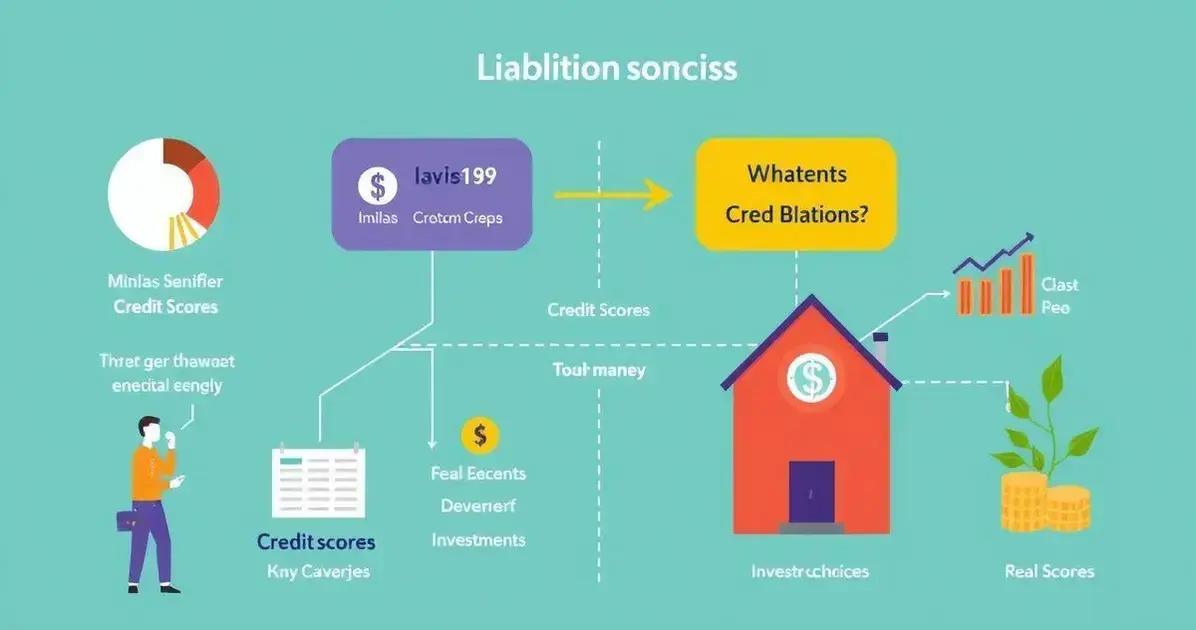Understanding Their Impact on Your Financial Health
Liabilities are crucial elements in personal finance that can affect your overall financial stability. Understanding how to manage your liabilities is essential for maintaining a healthy financial life. In this post, we’ll explore various types of liabilities, discuss effective management strategies, and understand their impact on your financial decisions.
What Are Liabilities and Why They Matter
Liabilities represent the financial obligations that an individual or organization owes to others. They are essential to understanding your overall financial picture. When you take on debt, whether through loans, credit cards, or mortgages, you create liabilities that need to be managed. Not addressing these obligations can lead to financial trouble and stress.
The Importance of Understanding Liabilities
Knowing what liabilities you have is vital. They affect your credit score and overall financial health. Monitoring your liabilities can help you avoid overspending and ensure that you live within your means. Additionally, it empowers you to make informed decisions to improve your financial condition.
How Liabilities Impact Your Financial Health
Liabilities play a significant role in determining your financial stability. If you have too much debt compared to your income, it can lead to a debt spiral. This, in turn, may restrict your ability to save, invest, or make large purchases. Regularly assessing your liabilities and finding ways to reduce them is crucial for long-term financial success.
Examples of Common Liabilities
Some examples of liabilities include personal loans, student loans, credit card debt, and mortgages. Each type has different implications for your financial health and understanding how they function within your overall financial portfolio is crucial in managing your liabilities effectively.
Types of Liabilities You Should Know

Understanding the different types of liabilities is key for managing your financial health. There are two main categories: current and long-term liabilities.
Current Liabilities
Current liabilities are debts that are due within a year. They include items such as:
- Credit Card Debt: Amounts owed on credit cards should be paid off quickly due to high-interest rates.
- Accounts Payable: Money owed to suppliers for goods and services received.
- Short-term Loans: Loans that need to be repaid within a year.
Long-term Liabilities
Long-term liabilities are debts that are paid off over a period longer than one year. Examples include:
- Mortgages: Loans taken out to buy property, typically repaid over 15 to 30 years.
- Student Loans: Loans to pay for education that can take years to repay.
- Bonds Payable: Money owed to bondholders, typically issued by governments or corporations.
Contingent Liabilities
These are potential liabilities that may occur, depending on the outcome of a future event. Examples include:
- Lawsuits: If a company is sued, it may have to pay damages if it loses.
- Product Warranties: The obligation to repair or replace defective products sold to customers.
Being aware of these different types of liabilities helps you to better assess your financial situation and make informed decisions.
How to Manage Your Liabilities Effectively
Managing your liabilities effectively is crucial for maintaining good financial health. Here are some strategies to help you handle your obligations:
1. Create a Budget
A budget allows you to see where your money goes each month. Start by listing all your income sources and then document your liabilities. Allocate a portion of your income to pay off these debts regularly.
2. Prioritize Payments
Not all liabilities have the same impact on your finances. Focus on high-interest debts first, like credit cards, as they can cost you more over time. This strategy can save you money and free up funds sooner.
3. Negotiate Terms
Don’t hesitate to discuss your liabilities with lenders. You might be able to negotiate lower interest rates or extended payment plans. Many lenders are willing to work with you if you reach out.
4. Reduce Unnecessary Expenses
Examine your spending habits and identify areas where you can cut back. Use these savings to pay down your liabilities more quickly. Every little bit helps!
5. Build an Emergency Fund
Having an emergency fund can prevent you from accumulating more liabilities during unexpected events. Aim to save at least three to six months’ worth of expenses to handle emergencies without going into debt.
By implementing these strategies, you can manage your liabilities more effectively and improve your overall financial situation.
The Impact of Liabilities on Financial Decisions

The impact of liabilities on your financial decisions can be significant. Understanding how to evaluate them is essential for making informed choices. Here are some key points to consider:
Financial: The Effect on Credit Score
Your outstanding liabilities directly affect your credit score. A high amount of debt can lower your score, making it harder to obtain loans or credit in the future. Keeping your liabilities in check can lead to better credit opportunities.
Influence on Spending Habits
When you have a lot of debt, you may be more cautious with your spending. This caution can prevent you from making necessary purchases or investments, such as buying a home or starting a business. Therefore, it’s crucial to manage your liabilities to make room for healthy financial decisions.
Impact on Saving for the Future
Heavy liabilities can hinder your ability to save. When most of your income goes towards repaying debt, you may struggle to set aside money for goals like retirement or emergencies. Reducing your liabilities can free up funds, allowing you to build savings.
Financial: Investment decision making
High levels of liabilities can also affect your investment decisions. You might hesitate to invest in opportunities for fear of increasing your financial burden. Clear understanding of your liabilities can help you assess risk versus reward more effectively in your investment choices.
In summary, knowing how liabilities influence various aspects of your financial life helps you make better financial decisions. By staying informed, you can navigate your financial journey with greater confidence.
Understanding Liabilities for Better Financial Health
In summary, liabilities play a crucial role in shaping your financial health and decision-making. Recognizing the various types of liabilities and their impacts allows you to take control of your financial future.
By effectively managing your liabilities, you empower yourself to make informed choices that can enhance your credit score, improve your savings potential, and facilitate thoughtful investment decisions.
Ultimately, a well-rounded understanding of your liabilities can lead to healthier financial habits and a more secure financial future. Take the steps necessary to assess and manage your obligations today!
FAQ – Frequently Asked Questions about Liabilities
What are liabilities?
Liabilities are financial obligations or debts that an individual or organization owes to others, impacting their overall financial health.
What types of liabilities should I be aware of?
The main types of liabilities include current liabilities (due within a year) and long-term liabilities (due over a longer period), along with contingent liabilities that may occur due to future events.
How do liabilities affect my credit score?
High levels of liabilities can lower your credit score by indicating higher risk to lenders, making it harder to obtain loans or credit.
What strategies can I use to manage my liabilities?
Creating a budget, prioritizing payments, negotiating terms with lenders, reducing unnecessary expenses, and building an emergency fund are effective strategies for managing liabilities.
How do liabilities influence my financial decisions?
Liabilities impact your spending habits, savings potential, investment choices, and overall creditworthiness, which all play a role in making informed financial decisions.
Why is it important to understand my liabilities?
Understanding your liabilities helps you take control of your financial situation, enabling you to make educated choices that enhance your financial health.




